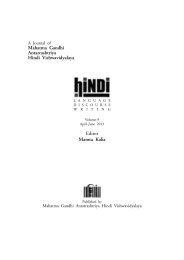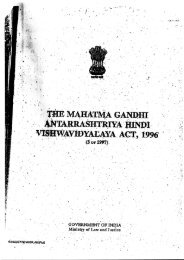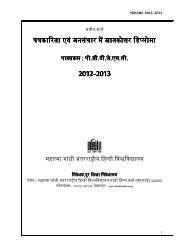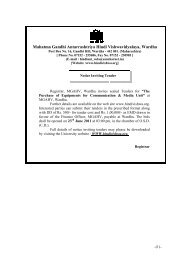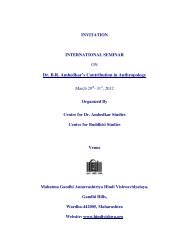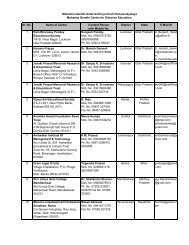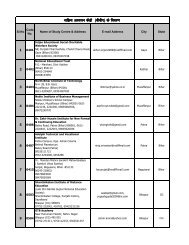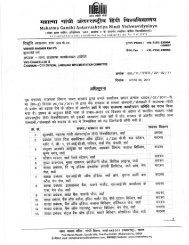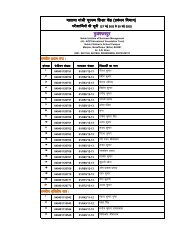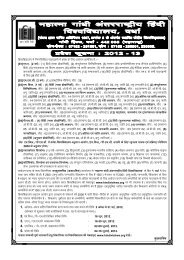A Journal of Mahatma Gandhi Antarrashtriya Hindi Vishwavidyalaya
A Journal of Mahatma Gandhi Antarrashtriya Hindi Vishwavidyalaya
A Journal of Mahatma Gandhi Antarrashtriya Hindi Vishwavidyalaya
You also want an ePaper? Increase the reach of your titles
YUMPU automatically turns print PDFs into web optimized ePapers that Google loves.
<strong>Hindi</strong> novels which talk about specific<br />
concerns related to ‘untouchables’ in Indian<br />
society. Nagar rejects caste system in this<br />
novel. He creates a story <strong>of</strong> a Brahmin<br />
girl who is married to an old man. The<br />
Brahmin girl falls in love with a scavenger<br />
boy and elopes with him from the toilet<br />
space since her suspicious husband locks<br />
her while going out. She becomes a part<br />
<strong>of</strong> the scavenger community after marrying<br />
the boy. Here she dedicates herself for<br />
the upliftment <strong>of</strong> this community. Likewise,<br />
in Parishishta, the novelist picks up the<br />
problem <strong>of</strong> a Dalit student who couldn’t<br />
bear the brunt <strong>of</strong> the hostile atmosphere<br />
in a premier educational institution and<br />
ultimately commits suicide . This is<br />
a typical Indian problem arising out <strong>of</strong><br />
caste based Indian society in spite <strong>of</strong> all<br />
provisions <strong>of</strong> Indian constitution to give<br />
every individual an equal opportunity<br />
barring caste, creed and religion.<br />
After independence many women<br />
novelists got prominence by depicting so<br />
far an untouched problem <strong>of</strong> Indian society.<br />
A great novelist <strong>of</strong> post independence India<br />
Mannu Bhandari came into prominence<br />
after the publication <strong>of</strong> her novel Aapka<br />
Buntee (Your Bunty/1971/). She depicted<br />
the problem <strong>of</strong> woman who is separated<br />
from her husband and lives with her only<br />
son Bunty. Here one comes across the<br />
trauma <strong>of</strong> a child who loves his father<br />
and doesn’t approve <strong>of</strong> his mother’s relation<br />
with another man. This is a new problem<br />
<strong>of</strong> growing middle class in urban India.<br />
Scores <strong>of</strong> Indian women novelists like Usha<br />
Priyamvada, Krishna Sobti,Mridula Garg,<br />
Manjul Bhagat, Prabha Khetan,Chitra<br />
Mudgal, Chandrakanta, Rajee Seth,<br />
Geetanjalee Shree, Maitreyi Pushpa etc.<br />
created novels which depicted the problems<br />
<strong>of</strong> Indian society in different ways.<br />
Concluding this paper it can be<br />
summarized like this— The <strong>Hindi</strong> novel<br />
is a protest literature as well as replica<br />
<strong>of</strong> Indian culture, psyche, development,<br />
aspirations <strong>of</strong> different classes and<br />
communities which is unique in its content<br />
and form. In fact the novel transcends<br />
boundaries and it is not only difficult but<br />
almost impossible to put the creative<br />
expression in watertight compartments.<br />
Here, I have only tried to say in a few<br />
words how the genre novel flourishes in<br />
India and its main characteristics. No doubt<br />
It is unique in its content and form and<br />
its linkage with the past is evident but<br />
basically it talks about humanity which<br />
links it with the novels being written all<br />
over the world.<br />
Thank you very much for listening<br />
to me patiently. I wish to convey my<br />
thanks and gratitude towards Pr<strong>of</strong>. Dr.<br />
Eva De Clercq and Pr<strong>of</strong>. Dr. Rishikalp for<br />
inviting me in this International <strong>Hindi</strong><br />
Conference at Ghent and giving me the<br />
honor to present my views here.<br />
References<br />
1) Early Novels in India, Meenakshi<br />
Mukherjee, Sahitya Akademi, New Delhi. 2002<br />
54 :: January-March 2012



